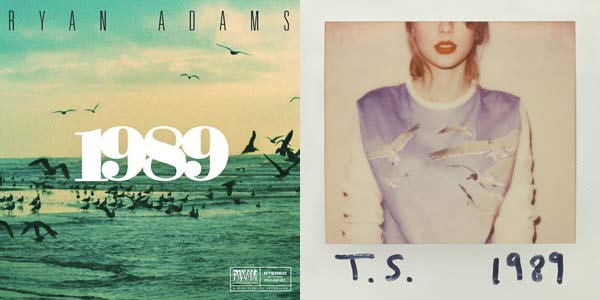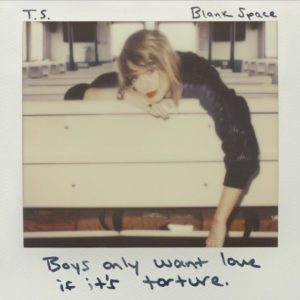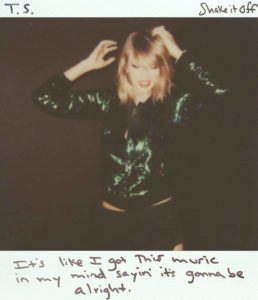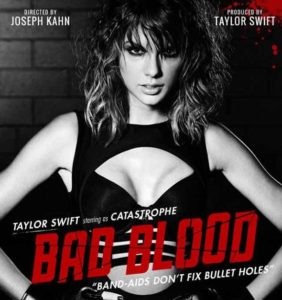 1989. The haters gonna hate, hate, hate, hate, et cetera, but they cannot change the fact that Taylor Swift released an undeniably good pop album.
1989. The haters gonna hate, hate, hate, hate, et cetera, but they cannot change the fact that Taylor Swift released an undeniably good pop album.
Now, having spawned five monstrous singles, Swift the songwriter is getting some of the credit she’s due, as in this amazing Grammy-Pro seminar where she exposes the process of writing and recording the LP.
I play in a cover band that’s touched at a least a third of these songs, and I occasionally play the album front to back on acoustic guitar for EV. I already know it has great bones, but also that some of Swift and her producers’ flourishes don’t translate well to an acoustic guitar.
In September, storied songwriter Ryan Adams covered the entire thing front-to-back. This is the sort of treatment typically reserved for gods of rock like Dylan or the Beatles, or at least Hall & Oates.
My question was: is it any good? And, more intriguingly: is it any better?
Let’s be clear here – I’m not approaching this head-to-head as a look at Ryan Adams mansplaining how great these songs are. They were already great. I’ve been on the praise-train of 1989 since first listen – I think it’s a timeless pop masterpiece that’s at once current and retro. But Adams is an ultimate chameleon, able to pen squalling rockers and sensitive ballads, many of which have been hits in hands other than his own. What happens when we reverse the process and bring someone else’s hits to him?
That’s the draw for me here. Adams is stepping onto a cover band high wire by bringing his own arrangements to some of the most-heard songs of the past year. If he delivers too many straight-up takes his effort will be castigated, but if he tears them all apart too much people will complain they’re unrecognizable.
What’s a master singer-songwriter to do? As it turns out, make a pretty damn compelling LP that would stand on its own just fine without the Swift comparisons. Unfortunately, that world doesn’t exist – so let’s make all the comparisons! The result? The ultimate 1989 mixtape.
“Welcome to New York”
Advantage: Adams
This is the only song on 1989 that feels fake and plastic to me, both in sound and sentiment. It’s sort of necessary as an introduction to the concept of Taylor Swift as the big city pop girl, but in the scope of the LP as a whole it’s disposable. Ryan Adams wisely snatches up the stylistic mismatch to recreate this as a Bruce Springsteen stomper, and it’s perfect. That’s what I want to hear welcoming me to the Big Apple.
 “Blank Space”
“Blank Space”
Advantage: Swift
No matter how you slice it, this song is pretty sparse. Swift builds the verses mostly with passing synths, which can make it a bitch to cover in an interesting way – we cut it from our sets in favor of “Bad Blood.” Ryan Adams goes to an Elliott Smith placeson it with a tremulous voice and two Travis-picked guitars mixed over one another. In sum, it takes this song to a much more wistful place. It’s a smart take, but I enjoy Swift’s big neon pre-kiss-off version more.
Notable Lyric Modification: “So damn reckless”
“Style”
Advantage: Swift
Ryan turns this into a sort of big 80s stadium rocker (or maybe an Arcade Fire outtake?). He messes with the sorta robotic Swiftian cadences a bit too much and doesn’t take all of Swift’s interval jumps (especially from her brilliant pre-choruses). Also, the main verse riff just isn’t making the best use of that Bm7 riff – I’ve done more interesting stuff with it. This song has some of the most interesting elements to work with, but Adams seems to just blow by them.
Notable Lyric Modification: “Daydream Nation look in your eye.”
“Out of the Woods”
Advantage: Adams
E and were just discussing how silly this sounds when we play it acoustic. You’re just chanting “OUTOFTHEWOODSOUTOFTHEWOODS” and trying to sneak in breaths where you can. Do you suppose Taylor Swift really wrote it that way sitting at her acoustic guitar, or was that a later insert? (Actually, you can find out in those Grammy Pro videos.)
Adams reimagines it in bedroom demo form as a plaintive strummer, and as much as I love the driving rhythm of Swift’s version the melancholy of this take feels so very right for the lyrics. By the time it breaks into a bigger arrangement in the second chorus it might supplant your original vision of how the song is supposed to sound. It also adds a pleasant instrumental outro, which Swift as a lyrics-focused rocker doesn’t tend to indulge in (no shade there, I don’t do them either). The only thing I’m missing is Swift’s descending counter-melody cutting through stacks of harmony on the final chorus.
“All You Had To Was Stay”
Advantage: Tie
 Adams has such a great stripped-down rhythm section intro to this, it could almost be a Ramones song. But it’s unrecognizable! I couldn’t even figure out what song it was until we got to the chorus lyrics. But, oh-my, the Elvis Costello jangle-pop of that chorus. It’s overwhelmingly welcome – Swift is at her processed squeakiest on this machine-tooled hook. Yet, the verses do too much hanging out on the high melody note without a lot of contrast.
Adams has such a great stripped-down rhythm section intro to this, it could almost be a Ramones song. But it’s unrecognizable! I couldn’t even figure out what song it was until we got to the chorus lyrics. But, oh-my, the Elvis Costello jangle-pop of that chorus. It’s overwhelmingly welcome – Swift is at her processed squeakiest on this machine-tooled hook. Yet, the verses do too much hanging out on the high melody note without a lot of contrast.
Given the choice, I’d mash-up Taylor’s verses with Adams’s choruses. They could be so happy together.
“Shake It Off”
Advantage: Swift
Don’t fight the dark side, Ryan!
Taylor Swift wrote a perfect 3-chord dance tune that holds up in cover sets next to songs like “Twist and Shout” and Adams seems to have a beef with every element of it. His cover could be described as “boringcore.” He strips down the rhythm to a simple snare rim, inverts the verse melodies and strips them of their variations, and doesn’t play with the repeated words on the chorus. You didn’t have to pick up the horn section to make an awesome cover of this – the Springsteen model would have worked.
Also, no attempt to interpret the whacky half-rapped bridge? Weak.
“I Wish You Would”
Advantage Swift
This starts with Adams seeming allergic to all of the best melodic elements of the original. Then the band leaps in to ape the big snare hits on the 3s and Adams snaps into one of the more straight-forward impersonations he’s delivered so far. There’s a lovely pile of guitars and organs to recreat all the fuss of the original chorus, and to be sure Swift’s version could have benefited from some more organic touches. Yet, the song gains nothing from anonymizing the verses.
 “Bad Blood”
“Bad Blood”
Advantage: Adams… maybe?
Look: both versions are undeniable high points of their respective albums. Swift’s version was the first song on the LP that made me stop and say, “Oh, shit, this is great.” So maybe it’s not a surprise that it holds the same position on Adams version.
It’s an incredibly straight-forward take that just slightly alters the rhythm by bringing more texture to the verses. Yet, it’s the texture that makes it so fascinating – especially a twinkling high guitar on the choruses. That all points to how strong the bones of this tune truly are. If you can see past trying to duplicate the massive drums, there’s a lot to work with in this four chords.
Notable Lyric Modification: “These kind of wounds, they always last.”
“Wildest Dreams”
Advantage: Adams
There’s an almost REM sensibility to the layered riffs in this one, flirting with each other and then departing on their own missions. This is another tune with great structure, but Swift’s version is SO cloying with how her voice lilts up on every phrase. Adams keeps it on the verses and cuts it on the choruses, and it makes all the difference. Adams handles Swift’s machine-gun bridge rhythm well, softening it without making it unfamiliar. Minor points off for having to insert “YOUR dress” – the line would have read more interesting without it.
“How You Get The Girl”
Advantage: Neither
This is one of the more basic songs on the album, but Ryan doesn’t do anything close to making it memorable, even with a gratuitous string section.. Some of his elements are just fighting each other. Meanwhile, Swift’s version should have been relegated to be a late-album-cycle soundtrack hit.
Bonus track “New Romantics” deserved this spot on both discs!
“This Love”
Advantage: Swift
Despite me not being much for ballads, this tune leapt out at me from early plays of the album for its liquid ease and patience in unfurling its chorus. Adams turns in a fine version with some lovely falsetto on the choruses, but Swift has got this late-80s power-ballad game on lock.
“I Know Places”
Advantage: Swift
The fascinating thing about this song is it’s Swift being menacing. Everything about it is a little scary, from the minor key descending leaps to the vultures, hunters, and foxes. It translates terrifically to a single acoustic guitar. Adams is a little too focused on dressing it up with castanets and not giving the creepy arrangement its due. Also, the first hit in his chorus is a muddle.
“Clean”
Advantage: Adams
Swift’s take on this song is a bit too languid, but a song about cleaning up your addictions should have a little bit of rubber-band snapping on the wrists tension to it. Adams fixes that, and the great lines stick out a bit more, like “butterflies turn into dust.” There’s not a moment of sensing that Adams is re- engineering something. The song feels solid and whole.